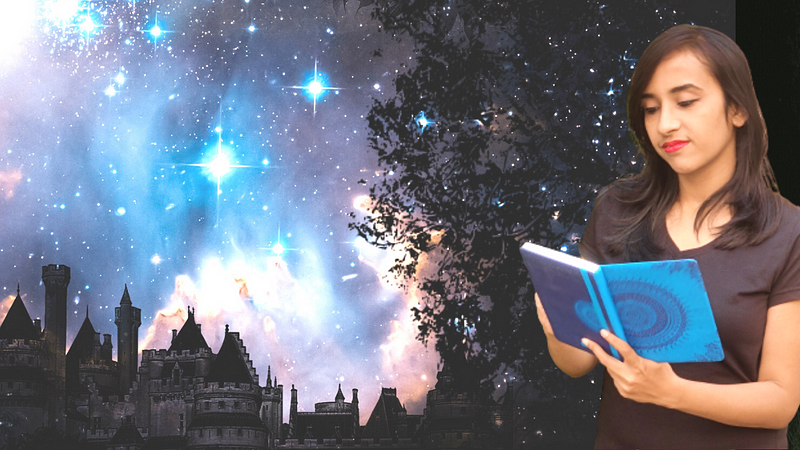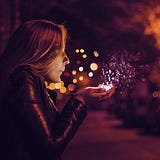Reading Fantasy Made Me Question the Existence of God
I can’t be the only reader who thinks like this?

I can’t be the only reader who thinks like this?
Do you read fantasy fiction (Game of Thrones, Lord of the Rings, Harry Potter, and the likes)?
It’s my favorite genre, but many people make fun of it, saying it’s too far from reality to ever leave a lasting impact.
“It’s just entertainment and cheap thrills,” they say.
But would you believe it if I told you that a good fantasy book often raises deep philosophical questions in my mind?
For example, I was reading Malice by John Gwynne (high fantasy) and I started wondering about the existence of God.
I’ve never been a believer and my stance has mostly been hovering between agnostic and atheistic.
But what if there was once a God (or Gods) who abandoned us humans because we are too self-absorbed?
Before we begin, and I know this is a heavy topic, but I’d love to know your stance on this. Do you believe in God? Why or why not? Leave a reply to this post and let me know in the comments.
And now, read to know how a fantasy novel made me question the roots of my existence.
(Note: Some links mentioned in this article are affiliate links. If you choose to purchase these books through them, it will help me earn a small amount — at no extra cost to you. Thanks!)
The Painful Evolution
Most high fantasy novels I’ve read share a similar theme.
The earth was created by a God or a variety of Gods who modeled the inhabitants after themselves. These inhabitants include humans, and often giants who live in harmony.
Over the years, as the inhabitants of the new world start exploring their surroundings and learn more about their capabilities, they distance themselves from the Gods. Often, it’s the fault of both parties, and as a consequence of this distancing, the Gods lose influence over their creations.
The humans and giants start living to fulfill their own dreams, rather than the ones imposed by the Gods. They team up with other creatures of similar interests and start seeing the different ones as “other.”
Clans are born, leading to tribes, regions, and often, countries. Boundaries are drawn upon the land where everyone was supposed to live in peace, even as civil war threatens to tear the land apart. Tyrants are born, man clashes with man, giant clashes with giant, and of course, man clashes with giant.
The differences grow so vast that the Gods grow tired of seeing this incessant series of killing and being killed. What follows is usually some sort of tragedy, a scourging where most of the people die, leaving behind a few packs of survivors scattered across the globe.
The Gods turn away from the planet, filled with disgust at the horrors their creations can bring about.
All the glory of the world they built is lost.
Then, an awakening follows; a renewal.
The packs of survivors with distant memories of the past write their own history, glorifying the role of their ancestors, and writing ancient rivalries in stone. Their children grow up believing this version of the truth, and soon, all knowledge of the origins of the world disappears.
With it, goes the magic.
The few who still practice it remember but a few words here and there, only capable of working small “miracles”, touted and celebrated as “sorcerers.” The world falls into further disarray, with only stone images of the Gods as reminders that they once played active parts in shaping the world.
Not a single soul remembers the infinite possibilities they’re capable of.
Most people, seeing the absence of divine intervention, start thinking of the Gods as a made-up concept. And because the Gods no longer have believers and worshippers, they lose power and shrink further into oblivion.
Once beings of immense power, the Gods are now forced to lead a meager life, struggling for the slightest spark of faith, for the smallest sign of a temple in their name that still welcomes believers.
Theology and Fantasy
If you’re a lover of high fantasy, you might be familiar with this theme in world-building. I read about this in Steven Erikson’s Malazan Book of the Fallen, Terry Pratchett's Small Gods, Neil Gaiman’s American Gods, Samit Basu’s Gameworld Trilogy, and more recently, in John Gwynne’s The Faithful and the Fallen.
If you’ve read a fantasy series talking along the themes discussed here, reply to this and let me know. I’m always on the lookout for new books to read, and fantasy fiction is my favorite genre.
Even if you aren’t familiar with this theme, you might have enjoyed reading about it here. The scope is so vast and enthralling, it always gives me goosebumps.
Are we cursed?
It makes me wonder what if we (the current generation) are suffering from a similar curse? I’m not one to adhere to superstition, but there are so many events from our history on this planet that scientists and paleontologists can’t explain.
I don’t want to start off a conspiracy theory thread here, but if you know the kind of “unexplained mysteries from the past” I’m talking about, leave a comment or hit reply, and we can continue this line of thought from then on.
This common theme in fantasy also often makes me marvel at how powerful fantasy writing is. Through made-up worlds and imaginary scenarios, the writers are able to raise questions in my mind, making me wonder at my roots.
The power of a good fantasy novel
This is one of the reasons why I love this genre so much. Through their words, fantasy writers can raise such powerful questions as to leave you spellbound. They show you scenarios that would make your blood curl in a “normal” setting. But because everything about a fantasy setting is unreal, you can read about the depths of human cruelty without batting an eyelid.
If you’ve never read fantasy but my words roused your curiosity, here are some books you can start with:
- Mistborn by Brandon Sanderson (Number of books: 3).
- The Name of the Wind by Patrick Rothfuss (Number of books: 3; ongoing series).
- The Priory of the Orange Tree by Samantha Shannon (Standalone).
If you don’t want to devote so much energy to start a new series, here are some fantasy TV shows you might enjoy (yes, better than Game of Thrones, plot-wise):
- American Gods (Medieval/urban fantasy based on the books by Neil Gaiman).
- The Witcher (Medieval fantasy based on the books by Andrzej Sapkowski).
- Castlevania (Dark medieval fantasy inspired by the popular video game series).
That’s all for today. I hope you enjoyed reading this. Even if you’re not a fantasy lover, I hope this post gave you something to ponder on.
I love how books make me ramble along these tangents, considering questions I wouldn’t otherwise have spared a second thought for.
Words are powerful. They expand your brain. They broaden the horizon of your imagination.
And even if you’ve never read fiction, talking about it could light a spark of curiosity.
What are some books that made you go into a contemplative mode, thinking about life, the universe, and everything (pun intended)?
Note: If you’re wondering why this post is so different from the articles I usually publish on Medium, it was originally published as a part of the free plan of the Books Are Our Superpower Book Club.
If you consider yourself an avid reader and a book lover, being a member can help you develop better reading habits, read personalized insights & summaries from hundreds of books, and nerd out about the books you love. Become a member today.
For more book reviews, follow me on Goodreads.
Click here to join my community of 1200+ innovative thinkers and ambitious action-takers.


